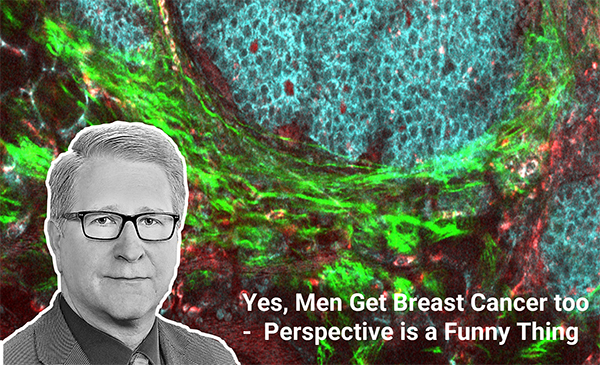Yes, Men Get Breast Cancer, too – Perspective is a Funny Thing

If you had asked me before Oct 2023, I would have said we (the industry and regulators) were doing a fairly good job globally of getting new treatment options out to the patients who need them. With expedited review processes and Right to Try allowances in many countries/regions, progress was being made, especially for those patients with terminal illnesses. After that date, I found myself questioning that perspective and asking if we were really moving fast enough.
The change in my perspective came suddenly when a biopsy from a lump on my chest came back as invasive ductal carcinoma (breast cancer). I was now the patient looking for answers and trying to understand possible treatment options. The weeks between diagnosis and surgery were some of the worst of my life (especially the nights). I had the unfortunate (or maybe fortunate) opportunity to be the patient struggling to determine what the future would hold. Was it terminal, or could it be treated? What breakthrough therapies or advances might be available?
Having lost four family members to terminal illnesses due to various cancers and now having cancer myself, I had a lot on my mind and more than enough time to reflect on the current challenges of our industry, especially as it relates to terminally ill patients waiting for that last chance breakthrough therapy to move its way through the repetitive and often challenging global submission and approval processes. Families and friends too often are left wondering, after the loss of their loved ones, what if?
After the surgery to remove my left breast (full mastectomy), the news was encouraging. The surgery had successfully removed two tumors, and the belief was that while the cancer had moved outside of the ductal tissue, the surgery had successfully removed all of it. With daily medication, the probability of recurrence would be low. While the outcome for me is promising but not guaranteed, those weeks of waiting, wondering, and reflecting on the industry have not left me.
While progress is being made, if we are truly focused on the patients and making available the life-changing innovations that are rapidly being developed, are we moving fast enough? For patients needing that breakthrough therapy, unfortunately, the answer is no, we are not. Particularly when considering the rapid advances in digitalization and knowledge sharing that are shrinking the geographical divisions that have been holding us back. Together, we can and must do more, work harder and faster to converge and streamline the regulatory submission and approval processes globally.
This does not mean less science. However, it does mean fewer repetitive reviews that add little value except to slow the global process. Ethically, we have a responsibility to always keep the patient at the center of all that we do. Ensuring that we are providing them with the medicines they need is and must remain our top priority. The patient is waiting. Let us work together to speed up the innovations they so desperately need globally.
In March of 2023 at PDA Week in Long Beach, California, PDA held its first industry roundtable that touched on this topic “Speeding Innovation through Global Regulatory Convergence”. You can read a summary of that roundtable here.


